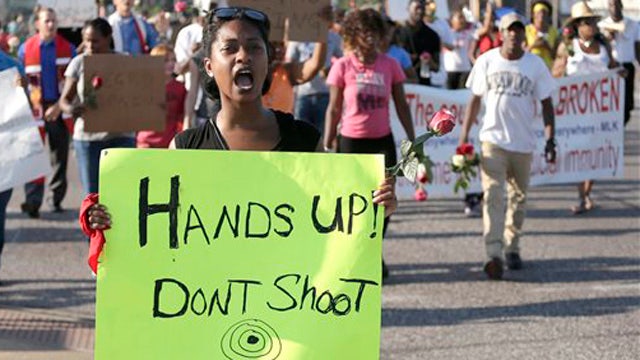Media coverage of the Michael Brown shooting
Howard Kurtz and Lauren Ashburn assess the news networks reporting of the chaos in Ferguson
President Obama tried to strike a careful balance with his White House remarks on Ferguson, expressing sympathy for community outrage over Michael Brown’s killing while also declaring that black crime would not be tolerated.
And he managed to make no one happy.
Dealing with racial conflagrations is especially difficult for the nation’s first black president. Obama pointedly told ABC’s Ann Compton on Monday that he was not going to the embattled Missouri town, and sending Eric Holder instead, because he didn’t want to put his thumb on the scale.
So why is he getting negative media reviews? Because he was too subdued. He is being found wanting on style points.
Politico declares that Obama “was guarded, reserved and deeply clinical….
“Obama kept his clear emotional distance, saying he understood ‘the passions and the anger’ over Brown’s death and that he’s ‘personally committed to changing both perception and reality’ about young men of color. But despite speaking at length about Ferguson, as Obama exited the White House briefing room half an hour later, many were left still wanting to hear more.”
And: “What struck observers about Obama’s comments was what he didn’t say — much of anything delving into the pain of the racial divide or the underlying tensions.”
Salon called the president’s remarks “tepid and brief.”
On Fox, Charles Krauthammer described the president as saying "if you riot and use guns and attack the police it serves only to raise attention and stir chaos. Well, that's an instrumental way of criticizing it, you're not going to achieve your goals. What he should be saying is that it's wrong. We're a democratic society you don't do that."
It’s true that Obama has appeared unemotional in many of his appearances over the last year. But Ferguson is a tinderbox right now, featuring nightly confrontations with police, lots of arrests and the shooting of several people so far. If there was ever a time when a president should exercise restraint, this would be it.
It's worth noting that the media establishment made precisely the opposite criticism of Obama on the two previous occasions that he waded into racial disputes. Then, it was said that he let his passions get the best of him and personalized the controversies.
When Trayvon Martin was killed in Florida, the president said, among other things, “If I had a son, he would look like Trayvon.” He got hammered for appearing to take sides against George Zimmerman before all the facts were in.
When Obama’s friend Henry Louis Gates was arrested at his own Massachusetts home, the president called the police decision stupid. That, too, brought a torrent of criticism about favoritism. Maybe, in taking a more restrained approach to the Michael Brown case, the president learned a lesson from his past missteps.
Let’s look at what he said. First, an effort to separate lawful dissent from those who are engaging in violence:
“It’s clear that the vast majority of people are peacefully protesting. What’s also clear is that a small minority of individuals are not.
“While I understand the passions and the anger that arise over the death of Michael Brown, giving into that anger by looting or carrying guns, and even attacking the police only serves to raise tensions and stir chaos. It undermines rather than advancing justice.”
Then a bow to the protestors and a swipe at overreaction by police:
“Let me also be clear that our constitutional rights to speak freely, to assemble, and to report in the press must be vigilantly safeguarded: especially in moments like these. There’s no excuse for excessive force by police or any action that denies people the right to protest peacefully.”
But also sympathy for African-Americans from a man who says he’s had the experience of hearing car doors lock as he crossed the street:
“In too many communities around the country, a gulf of mistrust exists between local residents and law enforcement. In too many communities, too many young men of color are left behind and seen only as objects of fear. And then when they’re conducting an investigation, I’ve got to make sure that I don’t look like I’m putting my thumb on the scales one way or the other.”
But he later circled back to the need to lock up lawbreakers, whatever the root causes:
“There are young black men that commit crime. And we can argue about why that happens because of the poverty they were born into or the lack of opportunity or the school systems that failed them or what have you, but if they commit a crime, then they need to be prosecuted because every community has an interest in public safety.”
Obama was elected in part because he seemed like a racial conciliator and had always avoided coming across as angry. His measured approach on Ferguson contained little drama, the way the media score these things, but he avoided inflaming a difficult situation.












































